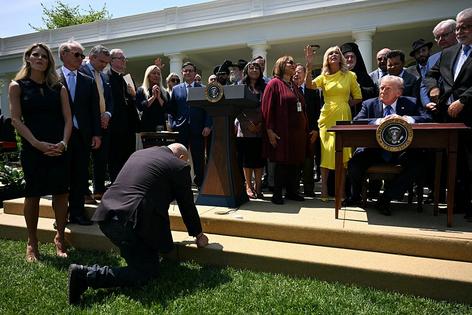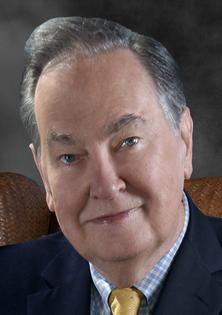Faith and Government
Last week, President Trump announced the establishment of a White House Faith Office. Its purpose, as described in a White House announcement, is to “…empower faith-based entities, community organizations, and houses of worship to better serve families and communities.” Don’t they already have access to a higher power?
There is no question that Christians, especially, but also Jews and Muslims have been targets of discrimination and bias. Some have been violent as we’ve seen at several universities that have tolerated, and in some cases encouraged antisemitism. Civil rights and other laws can address those instances.
Persecution comes with faith. Scripture says so. Totalitarian governments recognize only the power of the state.
Politicians have sought for millennia the approval of religious people to sanctify their agendas.
The Emperor Constantine did something similar to what President Trump has done. He legitimized Christianity and claimed to be one, but as Jasmine Alnutt writes for Calvary Chapel.com, “… many historians consider this a mere political conversion, noting that Constantine knew nothing of religion without politics…” Does this sound familiar?
Texas Lt. Governor Dan Patrick, who will head Trump’s commission on religious liberty, said: “There’s never been a president who has invoked the name of Jesus more than you. There’s never been a president who has said ‘yes, I love Jesus, but I love people of all faiths…’”
Never? Jimmy Carter comes to mind. Carter went to church and taught a Sunday School class. Trump rarely enters a house of worship. George W. Bush was open about his Christian faith. Trump can’t recite a single Bible verse.
Last week during a speech in Michigan in which he touted his accomplishments during his first 100 days in office, Trump said “hell” 21 times. I counted. He said “b…s…” once and frequently uses similar language that most churchgoers find vulgar and offensive. Yet they seem willing to project their own faith on a man whose behavior doesn’t reflect what even nonbelievers think should characterize a person who claims to be a Christian.
Yes, some good can come out of the faith office and some grievances can be addressed, but is it really necessary? Does God need government to defend Himself, or does a too close association with government diminish the power and influence of the church?
As William Bennett has written: “Certainly there can be no question that Constantine was a great blessing to the church. Scarcely in history have we observed such a complete and rapid transformation of a state’s values as the one that occurred in the age of Diocletian to Constantine. In one generation, the church went from suffering its greatest interference to enjoying its greatest patronage.”
It is also clear that Constantine’s marriage of the church and state had detrimental ramifications that would create enormous controversies and problems for the church in future generations, including denominational and political divisions.
Jasmine Alnutt adds: “Although many Christian contemporaries considered Constantine the ‘man of the hour’ whom God had raised up, his conversion was both a blessing and a curse to the Church. As (Bruce) Shelley (author of Church History in Plain Language) puts it, ‘The advantages for the Church were real enough, but there was a price to pay.’ One historian noted that Constantine ‘proceeded to create the conditions we call ‘state church’ and bequeathed the ideal to Christians for over a thousand years.’”
A picture at the White House ceremony establishing the Faith Office shows a man kneeling before President Trump. It is a prayer practice known to Christians, but an unbeliever might think it appears the man is bowing down to a king. It is not a good look. Neither is the Faith Office.
========
Readers may email Cal Thomas at tcaeditors@tribpub.com. Look for Cal Thomas’ latest book “A Watchman in the Night: What I've Seen Over 50 Years Reporting on America" (HumanixBooks).
©2025 Tribune Content Agency, LLC.




































Comments